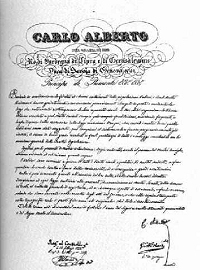February 17: What Does This Day Mean To Us?
Wherever they are in the world, each year on February 17, people of Waldensian heritage, as well as countless others whose faith has been influenced by Waldensians, celebrate the Edict of Emancipation. The following reflection on the meaning of February 17 appears in a posting on Viento y Luz, published by the presbytery of the South in Argentina.
Every February 17, as Waldensians, we remember an event that has profoundly marked our history: the recognition of the civil and political rights of the Waldensian people in Italy. In doing so, we are remembering not only a specific event that happened 174 years ago, but a journey of faith that was sustained by multiple generations who defended freedom of conscience and human dignity even while they were suffering persecution.
This memory explains who we are today. This is because the rights we were granted by royal edict in 1848 are not only a historical achievement, but a present responsibility. The meaning of February 17 is that the freedom we enjoy today cannot be understood only as a personal benefit, but as a gift that commits us to public life and to the communities in which we are inserted.
As a church that is an heir to the Reformation, the Waldensian Church believes that faith is not only to be lived out in freedom but also in commitment. The importance of equal rights is not just a legal affirmation but an evangelical conviction. All people are equally valuable before God and deserve to be able to live with justice, respect, and real opportunity.
In our Argentine context, where inequality, exclusion and violence often jeopardize basic rights, the commemoration of February 17 invites us to ask ourselves how we bear witness today. Are we using our freedom to care for others? Are we defending equality only with our words or are we joining actions of solidarity and accompaniment to our actions?
The Waldensian tradition reminds us that faith is not something that can be confined to church buildings but must be lived out in our commitment to human rights, education, peace, and democratic coexistence. To remember February 17 is to renew our call to be a present, sensitive, and active church.
May the memory of February 17 encourage us to continue building community, putting freedom and equality into the service of love and justice!
The Edict of Emancipation, which is pictured above, was issued on February 17, 1848, by King Carlo Alberto of Savoy, and gave political and civil rights, albeit imperfect and incomplete, to the Waldensians of northern Italy.

